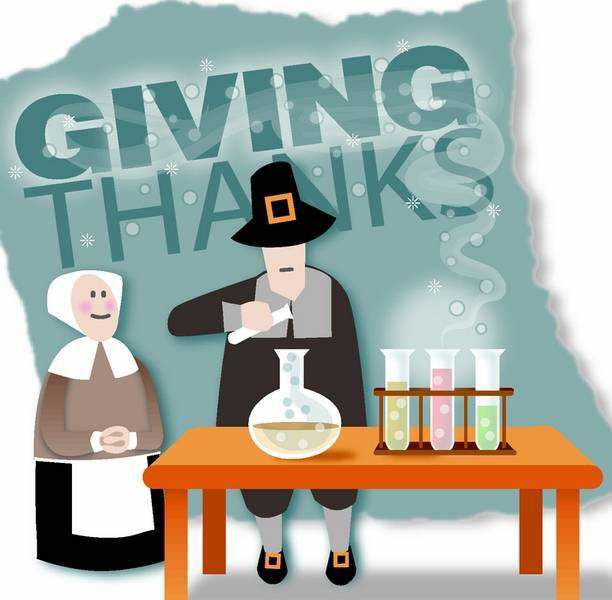Science of gratitude
Published 4:00 am Thursday, November 22, 2007

- Illustration by Greg Cross The Bulletin
As every school kid learns this time of year, the pilgrims knew the importance of giving thanks way back in the early 17th century. So why has it taken nearly 400 years for scientists to catch up?
Only in the past decade have psychologists and other researchers taken up the rigorous study of gratitude and giving thanks in hopes of understanding the role the emotion plays in our lives.
While many may consider the act of giving thanks — whether on Thanksgiving or throughout the year — simply a matter of civility, the research is showing that both individuals and society experience tangible gains from expressions of gratitude. Now the researchers are designing various exercises and interventions that can help individuals develop their gratitude into a daily habit and reap the benefits.
The study of gratitude really emerged only as psychologists shifted focus to look at positive emotions. Psychology has traditionally been focused on just the opposite, people’s unhappiness, and how to address it. People went to “get their head shrunk” because they were upset with something in their lives, to get help for their problems, not because they were happy.
“The umbrella term of positive psychology has been around for 10 years,” says Dr. Chris Peterson, a psychology professor at the University of Michigan in Ann Arbor. “Let’s look at the things that make life most worth living. So people started to look at the factors that lead to happiness and life satisfaction.”
But even within that field, gratitude was the forgotten factor, says Dr. Robert Emmons, a psychology professor at the University of California, Davis.
“It is easier than many topics that psychologists study, for example, brain scanning and attentional processes,” Emmons says. “Because gratitude is such a common and familiar experience to people and because they love to talk about it due to its positive benefits, it’s quite amenable to research.”
Emmons leads the Research Project on Gratitude and Thankfulness, perhaps the most organized effort to gather scientific data on the nature of gratitude, its causes and potential consequences for human health and well-being. The project is still in its infancy, but researchers have already uncovered a strong link between gratitude and happiness.
“Highly grateful people have a world view in which everything they have and life itself is a gift. This leads to a different interpretation of experience,” Emmons says.
As a result, they are less likely to take things for granted or to become accustomed to their positive environment. And that likely leads to greater happiness over time, he says.
“They feel more alert, alive, interested, enthusiastic,” he says. “They also feel more connected to others.”
At the same time, gratitude serves as a buffer against the negative emotions. It tends to accentuate the positive. Grateful individuals place less importance on material goods and are less likely to judge success — theirs and others — in terms of accumulated possessions. They are less envious of wealthy persons and more likely to share their possessions with others.
“Grateful people are less likely to experience envy, anger, resentment, regret and other unpleasant states that produce stress and thwart positive emotions,” Emmons says.
Gratitude laboratory
Those finding were based on a number of experiments designed by Emmons and his colleagues. In one, they had test subjects perform different gratitude exercises, such as thinking about a living person to whom they were grateful or writing a letter expressing gratitude. The test subjects scored much higher on measures of positive emotions after the exercise than did a control group, which was asked to describe their living rooms. (However, the study was conducted before the widespread availability of widescreen TVs, so describing living rooms may lead to more happiness now.)
Emmons also pioneered the use of gratitude journals, a sort of thank-you diary in which individuals wrote down things for which they were grateful.
He found that test subjects who kept gratitude journals on a weekly basis exercised more regularly, reported fewer physical problems, felt better about their lives as a whole, and were more optimistic about the upcoming week compared with those who recorded their hassles or just chronicled their days.
And people who recorded gratitude over a two-month period were more likely to have made progress toward important personal goals, such as success in school or work. Another experiment found that individuals who performed a daily gratitude exercise were more likely to help someone with a personal problem or offer emotional support to another.
Even persons with a neuromuscular disease, who one might think had plenty of reasons to be unhappy, benefited from gratitude interventions. They reported greater frequency of positive moods and a greater sense of feeling connected to others, gave more optimistic ratings of one’s life, and had better sleep duration and quality.
“If you encourage folks to keep track every day of the things that went well, the things they’re grateful for — kind of the old Irving Berlin ‘Count your blessings instead of sheep’ — they end up happier,” Peterson says. “And these results are sustained, at least in so far as the person keeps doing this.”
Studies also suggest that expressions of gratitude might have a more tangible payback. One study found that customers of a jewelry store who were called and thanked for their purchases, bought 70 percent more merchandise after the call than those who were not thanked. Another study found that servers in restaurants received bigger tips if they wrote ‘thank you’ on patrons’ checks.
Meanwhile, kids who are taught to say please and thank you were found to do better at school.
“We usually think that how well you do at school is the result of innate intelligence or whether you have parents who are driving you to succeed,” Peterson says. “What I always tell parents when I speak to them is the most important resources you can give your children are the skills of getting along.”
Cause and effect
Even as researchers document what happens when people are grateful, though, they’re still not sure why it happens. Some have posited that gratitude has an evolutionary benefit, that people who were grateful were more likely to be incorporated into social groups, which benefited survival. And those who expressed gratitude may be more likely to receive further gifts, which in turn reinforces the behavior.
Emmons says there’s also some suggestion that whether through stress reduction or other physical means, grateful people tend to have better immune systems and produce different levels of hormones. Researchers are now trying to study what areas of the brain are activated by feelings of gratitude, hoping to learn more about how it affects our physical well-being.
All of those physical changes may have a role in promoting feelings of happiness or satisfaction. But research into the dynamics of how gratitude leads to that end is still lacking.
“Here’s one place where the work hasn’t been done in fine detail,” Peterson says. “My speculation is that there are probably multiple roots, multiple dynamics. One of them is it creates bonds with other people.”
As much as Americans like the image of the rugged individualist, Peterson says that giving thanks is in part an admission that we do rely on others in nearly every aspect of our lives.
“Nobody ever did it alone. I think there’s something to be said for acknowledging it,” he says. “But it’s also more optimistic to realize the world also has good will in it.”
Saying thanks
Expressing your gratitude might be the final step to securing the benefits for yourself. It’s one thing to feel grateful, quite another to express gratitude.
“We realize that our gratitude is incomplete unless it is expressed,” Emmons says. “There is a dynamic to give back the goodness that we have received from others. Emotional experience in general is incomplete if that feeling is not put into action.”
Still, expressing gratitude is not always easy. In one of his college classes, Peterson has his students write a letter of gratitude to their parents. Many of them resist the exercise as corny or unnecessary. “My mother knows,” his students often claim. Peterson will have none of it.
“There’s no parent in the world who would think that is corny,” he tells them. “If she says, ‘I knew that,’ I’ll pay your tuition. I’ll bet what mom does is cry.”
Of course, the thank you letters, the gratitude journals won’t lead to long-term happiness, Peterson says, unless you do it more than just the one time.
“You do it one day at a time. It becomes a habit,” he says. “It’s hard, but the more you do it, the more natural it becomes.”
So while Thanksgiving can provide the impetus to think about the things for which we’re grateful, Peterson argues it should be considered just the starting point for a lifetime of gratitude.
“It’s a shame if the expression of gratitude is limited to one day a year, sandwiched between the Dallas Cowboys and the Detroit Lions,” he says. “That’s just really missing the point.”
Ways to become more thankful
Dr. Robert Emmons, co-director of the Research Project on Gratitude and Thankfulness, offers the following tips for developing your gratitude year-round.
• Keep a gratitude journal. Establish a daily practice of reminding yourself of the good things you enjoy in your life.
• Remember the bad. To be grateful in your current state, it’s helpful to remember the hard times you once experienced. When you remember how difficult life used to be and how far you’ve come, you set up an explicit contrast in your mind.
• Ask yourself three questions. The meditation technique known as Naikan involves reflecting on three questions. What have I received from ____? What have I given to ____? What troubles and difficulties have I caused?
• Make a vow to practice gratitude. Research shows that making an oath to perform a behavior increases the likelihood that the action will be executed.
• Go through the motions. Even if you don’t feel grateful, smile, say thank you and write letters of gratitude. Eventually, the emotion of gratitude will be triggered.
• Think outside the box. If you want to flex your gratitude muscles, look for new situations and circumstances in which to feel grateful.






